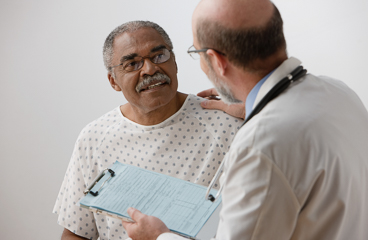
Overview
You are an important part of your health care team. You can help make your time in the hospital as safe as possible.
Try to take part in every decision about your care. Ask a family member or friend to help you keep track of the details of your treatment. When you are having surgery or are very sick, having another person who can ask questions for you is a big help.
You have the right to question anyone involved with your care. Don't be afraid to ask. If you don't understand a procedure, ask your care provider to explain it to you. Do you have questions about medicines or your treatment? Go ahead and ask. It's okay to speak up if you have concerns about safety.
Follow-up care is a key part of your treatment and safety. Be sure to make and go to all appointments, and call your doctor if you are having problems. It's also a good idea to know your test results and keep a list of the medicines you take.
How can you care for yourself?
In the hospital
- Tell your doctors ALL the medicines, vitamins, supplements, and herbal remedies you are taking. Bring a list of these with you to the hospital.
- Tell your doctor about any allergies or reactions you have to medicines. If you take blood-thinner medicines, make sure that your care team knows this.
- Every time someone gives you a medicine, make sure that the person checks your hospital ID bracelet first. Be sure that they have checked that you are getting the correct medicine and the right dose.
- Ask all health care workers and visitors who have direct contact with you to wash their hands. This helps prevent the spread of infections in the hospital.
Before surgery
- Make sure that you, your doctor, and your surgeon agree on what will be done. If you don't understand what will happen, ask questions at any time.
- Be sure that the surgeon knows the exact spot of the surgery. Most hospitals require surgeons to write their initials on the surgery site. If you are having surgery on your left knee, for example, the surgeon should write on your left knee.
- Be sure that someone has asked your name and date of birth before your surgery.
Going home
- Make sure that you take home a list of medicines. It should include directions for how to take the medicines. Make sure that it is safe to take any new medicines on your list with any regular medicines you take.
- Ask if any of the medicines will make you dizzy. These medicines could increase your risk of falls. You will need to be more careful.
- Be sure that you have directions for all of your care at home. You will get other instructions for that.
Where can you learn more?
Go to http://www.healthwise.net/patientEd
Enter H800 in the search box to learn more about "Safe Hospital Stay: Care Instructions".
Current as of: July 1, 2025
Author: Ignite Healthwise, LLC Staff
Clinical Review Board
All Ignite Healthwise, LLC education is reviewed by a team that includes physicians, nurses, advanced practitioners, registered dieticians, and other healthcare professionals.

